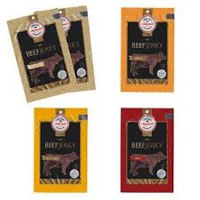
The Jewish religion incorporates within its tenets a regimen of dietary laws. These laws determine which foods are acceptable and conform to the Jewish Code. The word kosher is an adaptation of the Hebrew word meaning “fit” or “proper.” It refers to foodstuffs that meet the dietary requirements of Jewish Law. Market studies repeatedly indicate that even the non-Jewish consumer, when given the choice, will express a distinct preference for kosher certified products. They regard the kosher symbol as a sign of quality.The barometer of Kosher and non-Kosher depends on two variables: the source of the ingredients and the status of the production equipment. Kosher certification, which is the guarantee that the food meets kosher requirements, revolves around these two criteria. Just as a kosher consumer would not borrow his non-kosher neighbor’s pots to use in his kitchen, non-kosher equipment cannot be used in the production of kosher foods.
Meat – Dairy – Pareve The kosher designation of “dairy” refers not only to all milk and cheese products, but includes all foods containing dairy derivatives. This category includes foods such as ice cream, cookies or crackers containing whey or milk powder, or products that contain no dairy ingredients but are heat-processed on equipment that was utilized for the production of products that do contain dairy ingredients. Many products on the market today contain dairy-based flavors and ingredients, thereby requiring a dairy designation on the packaging. For example, soft drinks, cake mixes, candies, and flavored coffees, to name a few, may contain flavorings with dairy-based derivatives. Creamers labeled as non-dairy, from a kosher perspective, may in fact be dairy if they contain sodium caseinate, another dairy derivative. Starter distillate, often used in foods to enhance mouth feel, actually is distilled from dairy components and therefore is treated as a dairy product. Cheese Products Meat, Poultry, and Fish Kosher birds must have a crop, an extra finger, a gizzard that can be peeled, and must not be a bird of prey. Today Jews eat only birds that we know our ancestors ate such as chicken, certain duck and goose. Kosher fish must have both scales and fins. Shellfish such as shrimp and lobster are prohibited as well as swordfish, sturgeon, catfish and eel, to name a few. Generally, kosher fish production requires a supervisor to be present to verify that the fish is a kosher species. Lastly, the packaging of all meat, poultry, and fish products must bear the proper kosher seal. Meat and poultry from kosher animals that are slaughtered by humane methods as dictated by Jewish Law, and carried out by specially trained ritual slaughterers, are permissible. In addition, the meat and poultry must then be soaked, salted and de-veined. Only then is it fit for kosher consumption. A variety of food products contain ingredients derived from animal sources. In order for the product to be certified kosher, the animal must be kosher. For example, stearates, a common additive in the production of confections and pharmaceutical tablets, may be derived from tallow. Fatty acids and mono and diglycerides used in salad oils, shortenings, and baking products, may be animal based. The list also includes gelatin, used in a variety of candies, desserts and medications, as well as glycerin, often used to flavor liquid medications. Wine, Grape Juice, and Grape Derivatives The production of kosher meat, poultry, fish, wine and cheese involve particularly labor intensive requirements. Consequently , they generally are manufactured and sold exclusively to the kosher consumer rather than the general market. The additional cost of these special productions is passed on to kosher consumers who are willing to pay a premium for these products. Most other items, e.g. baked goods, beverages, cereals, confections, industrial chemicals, snack foods, and food ingredients not derived from animal sources, qualify for kosher certification with minimal, if any, disruption in normal operating procedure. Fruits and Vegetables Canned fruits and vegetables which are processed on equipment used exclusively for kosher productions, are acceptable and may easily be certified. Similarly, products derived from fruits and vegetables, e.g. purees and pastes, baby foods, juices, jams and jellies with the exception of grape, generally present little problem in getting certified. One caveat would be agricultural products in the fruits and vegetables section coming from the land of Israel which have their own unique kosher requirements and are acceptable only with reputable supervision. Equipment: Keeping it Kosher Non-kosher equipment usually can be restored to a kosher state in a variety of ways, usually depending upon the production process of non-kosher items. This process is referred to as Kosherization. The laws regarding what equipment can be kosher and under what circumstances they can be kosher are complex. Therefore only a trained Rabbi is competent to oversee the procedure. Usage of a non-kosher product in conjunction with liquid, e.g., a non-kosher soup, requires a thorough cleaning and the use of boiling water in order to restore its kosher status. Non-kosher products that were produced where there is no liquid cooking medium, e.g., an oven band, require a different technique. This equipment must be treated with high heat in order to restore its kosher status. |

 STAR-D
STAR-D STAR-S
STAR-S